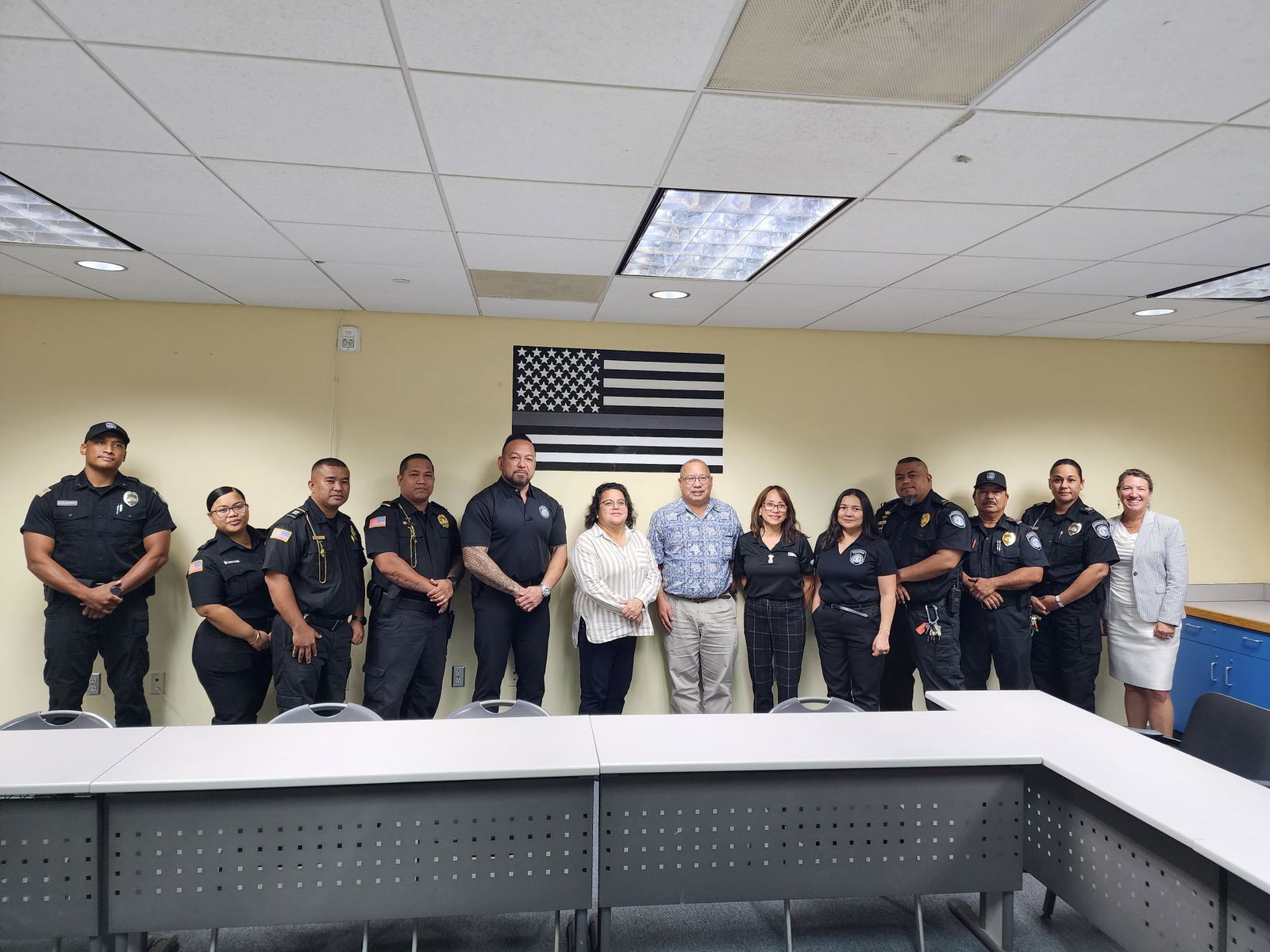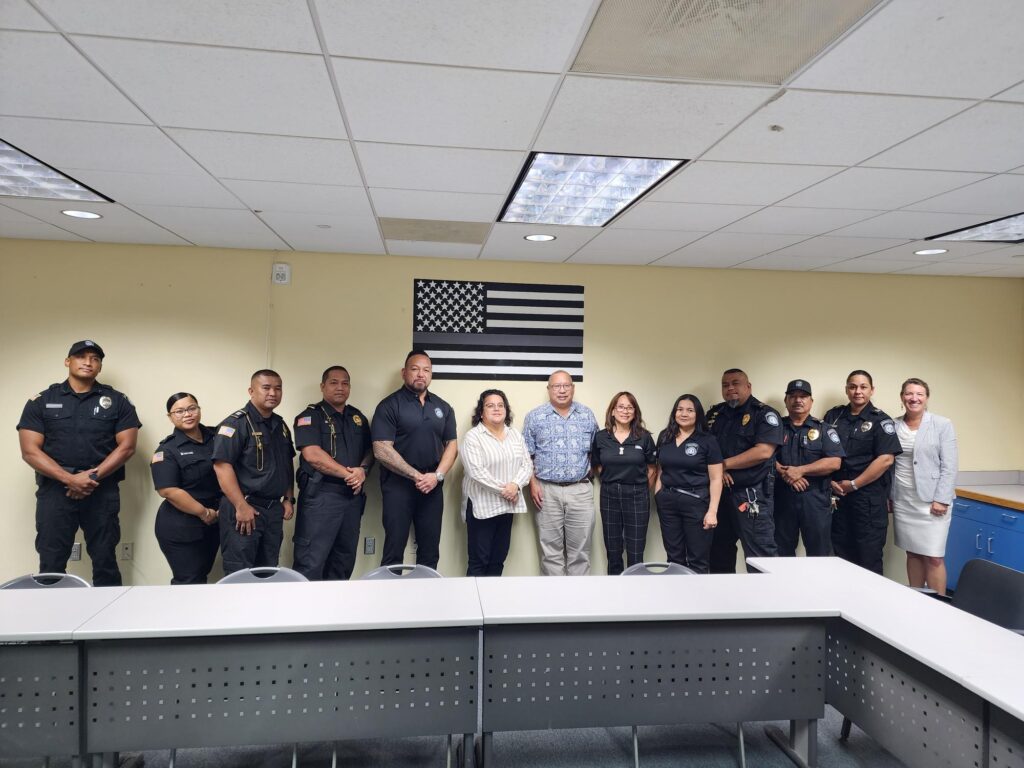
Guam State Clearinghouse Officer Stephanie Flores, center, with Guam Department of Corrections Director Fred Bordallo, Guam Department of Youth Affairs Director Melanie Brennan, CNMI Corrections Commissioner Anthony Torres, and CNMI Corrections officers pose for a photo during a press conference at the Saipan Corrections facility on Wednesday afternoon.
THE plan to transfer Guam inmates to the Saipan prison facility is still in its initial phases, Guam and CNMI officials told reporters at a press conference at the Vicente Taman Seman Memorial Building in Susupe on Wednesday.
“We are trying to find ways to support the populations of Guam and the CNMI — we are one people, just separated by water,” Guam State Clearinghouse Officer Stephanie Flores said.
Flores and other Guam officials were on Saipan to meet with CNMI Corrections Commissioner Anthony Torres, Gov. Arnold Palacios, Lt. Gov. David M. Apatang, Attorney General Edward Manibusan, and Rep. Marissa Flores, who chairs the House Committee on Judiciary and Governmental Operations.
“This morning’s discussion was very, very, preliminary,” Stephanie Flores said. “We want to make it clear that…no agreements have been made just yet. We are in the very early stages, exploring what options are out there to help the CNMI and to also help Guam. That’s really where we are. We’re in very preliminary discussions on how we can help and how we can be of help to each other.”
The other visiting Guam officials included Department of Corrections Director Fred Bordallo and Guam Department of Youth Affairs Director Melanie Brennan.
“There’s lot of logistics that have to be done, there are lots of questions that have to be answered, there are a lot of things that both sides, [Guam and the CNMI] have to consider on their own about what we are going to do, and how we are going to go forward…and if we are going forward,” Stephanie Flores said.
She said “there will be no movement of inmates right away, and…that will not happen unless the CNMI community is on board 100%.”
“We want to make that very clear, that we are still in the very early stages of discussion — we have a lot of questions, the CNMI commissioner has a lot of questions, both Guam and CNMI governors have lots of questions, [and] we understand [that the CNMI] Legislature has a lot of questions — this is good,” Stephanie Flores added.
“We want to make sure that the process is as transparent as possible. We want everybody to ask the questions they want [to ask], because we want this to be a situation where everybody’s going in with their eyes open, everybody’s expectations are managed, and everybody gets to ask questions they need to ask, and answers as honest as possible — so that is our starting point,” she added.
According to Commissioner Torres, “People come first, people’s opinions come first. As we move forward we’re going to inform the community by launching a public information campaign [and] having townhall meetings. We’re going to hold public forums. We want to collaborate with local organizations. We want the community to be a part of this. This is going to be a collaborative effort with the community.”
Guam Corrections Director Bordallo reiterated that the current discussions were preliminary.
“That is really what’s valuable in coming out here, in having this good exchange, and learning the concerns of the CNMI community,” he said. “The challenge in Corrections is that the security needs to be up to speed in terms of ensuring inmate confinement and at the same time preparing them for society.”
He said Guam’s facilities are in “overcapacity situation right now,” adding that they are currently housing 848 inmates.
If the plan is implemented, “is this going to be on the dime of the CNMI taxpayer?” Stephanie Flores asked. “And the answer is no. The cost associated with…transferring prisoners…will be part of negotiated agreement,” she added.
Once the Guam inmates served their sentences at the Saipan facility, “they will be returned to Guam,” she said.
As for the selection process for the Guam inmate transfer to Saipan, Torres said they must be “non-violent offenders — local Guam inmates who are serving their sentences…not detainees, not pretrial, just the ones serving their sentences.”
Stephanie Flores is inviting the public in both Guam and the CNMI to express their concerns regarding the plan.
“Be open on what those concerns are, voice those concerns, give both sides [the CNMI and Guam] an opportunity to address those concerns,” she said. “The only way that we will come to a resolution in any of this…is if the concerns from the public are known…. The public needs to be as involved in this process as possible, so when Commissioner Torres announces there’s going to be a townhall, please show up and please bring your questions…and give us the opportunity to address those questions. You might raise a concern that the commissioner is not thinking about. Same thing with the people of Guam. We invite those types of discussion. You have a concern with us doing this, or entertaining this idea, you got to tell us, because we are not going to do what’s not good for the entire community…what we can’t justify as being good for the community,” Stephanie Flores said.











